Manuscript Albums from the XIX – early XX Centuries
“The album is a memorial of the soul...” (sic)
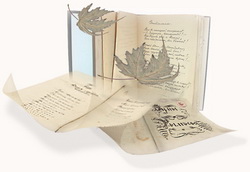
The history of the manuscript album has old roots. As a feature of the royal lifestyle, the culture of albums, which came to Russians from Western Europe in the second half of the XVIII century, experienced the greatest expansion in the middle of the XIX century.
Manuscript albums were popular not only in prominent cities but in the provincialities. As a rule, poems of famous authors, separate aphorisms and citations from well known works, and occasionally the writer's own works were entered into an album. One could also run across drawings in an album. Composition of albums was done by men as well as women. Nonetheless, the laurel garland on this one points to the fact that its owner belonged to the feminine gender. It is relevant to recall that the creation of an album as a contemporary fad was described by A. S. Pushkin in his romance “Eugene Onegin”. And certainly not by accident one of the originators of the album culture was V. L. Pushkin (the great poet's uncle), very accurately calling a manuscript album as “a memorial of the soul” (sic)[1].
Albums, which are carefully preserved in the collections of many large libraries, express themselves by capturing readers' fondness and literary passion for past epochs.
There are such albums in our collection of manuscript documents. One of them presents the free spirited lyrics of Pushkin, and in another – the fiery works of Ryleyev. When taking into account the thematics of the albums and the details of the writings, then it is quite likely, that they could have been owned by young, educated people – contemporaries of the XIX – early XX centuries. Most of the poetic works of that time, primarily those in which independence was eulogized and anger was expressed against slavery, were simply not published. The progressive youth rewrote them by hand from album to album. The original
“self-publishers” of centuries past.
Sooner than not, the albums made their way to the library through private collections. Judging from the fact that one of them is stamped “Kherson Central library” (and not “Kherson Community Library”, as from its origins), they could have come to us after the nationalization of royal book repositories and family archives in the twenties of the XX century. Ascertaining the names of the owners precisely is impossible. But the content and thematics of the albums, the external appearance and calligraphy allow for composing a portrait of their owners, coming nearer to the world of their thoughts and feelings.
Based on the external marks of the paper and characteristically reserved mounting of the bindings of our documents, they can, in all likelihood, be dated to the second half of the XIX-early XX centuries.
The album not shown, entirely bound in proprietary red cloth, with gold lettering, “Pushkin” on the cover, fits 89 pages, written compactly, in fairly neat script without the use of any artistry. At the end of the album there are 12 clean pages. The paper is foreign, possibly, French manufacture
with the watermark «LACROIX FRЁRES» (LaCroix Brothers). The estimated production date of the paper – after 1860 [2].
The album entries are 52 poems by Pushkin , written by the poet during 1816-1836. Among the poems of a patriotic nature is a lyric of love. One notes the absence of some sort of chronological sequencing in the arrangement of the writings. But what is noticeable is that the album begins with the poem
“Liberty”, а завершує
«God, Protect the Czar!». Under a number of the poems the following initials are written -
«A.P.» “A.P.”, “Ar.P.”, and “[L.]P.”. Regretfully for now, they remain a mystery to us. However, it is not excluded that the owner of the album noted the authorship of the works in this manner.
 The history of the manuscript album has old roots. As a feature of the royal lifestyle, the culture of albums, which came to Russians from Western Europe in the second half of the XVIII century, experienced the greatest expansion in the middle of the XIX century.
The history of the manuscript album has old roots. As a feature of the royal lifestyle, the culture of albums, which came to Russians from Western Europe in the second half of the XVIII century, experienced the greatest expansion in the middle of the XIX century.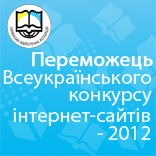
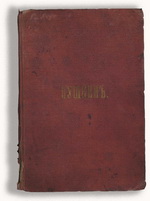
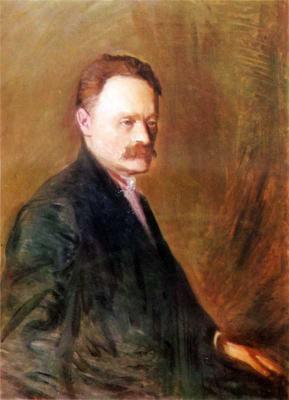
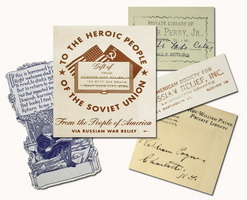

Comments
Жизнь музейного предмета, его путь от владельца до фондов - всегда интересная тема. Спасибо, что собираете, храните и рассказываете о своих экспонатах
Дорогая Наталья! Благодарим за теплый отзыв. Нам очень важно ваше мнение, поскольку мы ведь и работаем, собственно говоря для тех, кто этим интересуется, кому небезынтересна эта тематика. Вы правы, эта тема весьма увлекательна и захватывающа. Надеемся, что вы станете нашим постоянным читателем!
Музей книги.
Это чрезвычайно важная тема, хотя может показаться, что рукописные альбомы - вещь легкомысленная, однако они сообщают нам очень много как об индивидуальном владельце, его внутреннем мире, так и об эпохе, в которую он жил.
Новейшее время, увы, лишит нас этих артефактов, поскольку скоро мы разучимсяч писать руками и рисовать на бумаге.
Время, возможно лишит, но библиотеки, пожалуй, все же постараются сохранить имеющееся. Во всяком случае, они прилагают к этому максимум усилий уже сейчас. Будем надеяться на лучшее, Станислав Александрович.
Музей книги